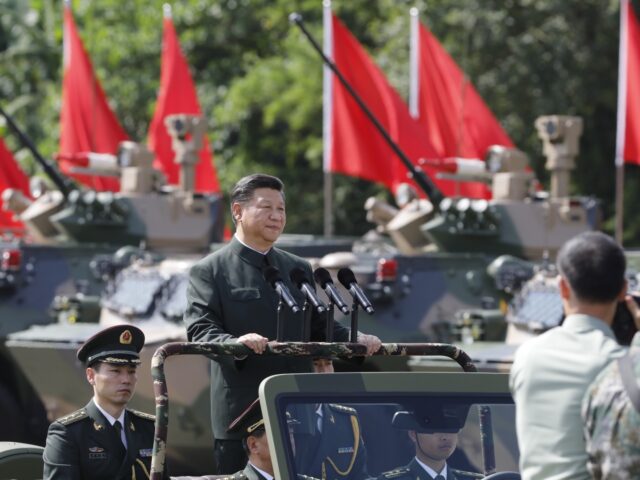The “battleground” of the Cold War between Communist China and the United States will be waged in capitals across the European Continent, a former People’s Liberation Army (PLA) has claimed.
Writing in the Jack Ma-owned South China Morning Post, retired Chinese Colonel Zhou Bo claimed that the Cold War between Beijing and Washington will be fought over influence in Europe, which he claimed will be divided between its reliance on America for its defence and China for trade.
Zhou said that “the competition” between the two powers will principly be over “who can win over the third parties.”
Declaring, with some evidence, that Beijing has successfully undermined U.S. influence in Africa and South America, the retired military commander said therefore the “battleground… will be in Europe, where the US has most of its allies and where China is the largest trading partner.”
Predicting a decline in American military presence in Europe in favour of a build up in the Indo-Pacific to confront China, Zhou went on to say: “Successive US presidents, Republican and Democrat alike, have asked Europeans to take greater ownership of their security. In other words, Europe has to have strategic autonomy, even if it doesn’t want to.”
The “strategic autonomy” of Europe the former Chinese colonel mentioned was a reference to recent comments from French President Emmanuel Macron following a state visit with Xi Jinping in Guangdong, after which he argued that the EU should not “follow” the United States into a war with Beijing should the communist regime launch an invasion of Taiwan and said that Europe needs “strategic autonomy” from the U.S., including reducing the reliance on the American military and currency.
Macron: Europe Should Reduce Reliance on U.S. Dollar, Avoid ‘Following America’ into Conflict with China https://t.co/YvVYV9qCTe
— Breitbart London (@BreitbartLondon) April 10, 2023
The comments from Macron drew the ire of politicans from Washington to Berlin, with U.S. Senator Marco Rubio questioning if the French president “spoke” for all of Europe, and suggested that maybe America should roll back its financing of the war in Ukraine, which is supposedly protecting the rest of the continent from Russian agression.
“That Europe takes China as a partner, competitor and systemic rival at the same time says more about Europe’s confusion about China, than what China really is,” Zhou wrote, noting that the difficulty for Europe is that it “cannot afford to have sour relations with Beijing and Moscow at the same time.”
Indeed, despite the EU’s alleged commitment to human rights, which the communist regime is one of the chief offenders of globally, there are still many in the bloc who have argued for increased trade ties with China — often under the guise of trying to move the world’s top emitter on climate change, however, the deep business ties, particulalry with Germany, are likely the main motivation for politicians preaching the supposed value of a closer connection with the Chinese regime.
Interestingly, the former PLA colonel said that he believed that there is currently “only one scenario” in which the current status quo between Europe and China could be fundamentally disrupted: “a war in the Taiwan Strait”.
“But there is no evidence that Taiwan is bound to become the next Ukraine… Beijing knows more than anyone that peaceful reunification is in its best interests, and more importantly, that it is still possible,” Zhou wrote.
For Zhou, who now serves as a senior fellow of the Centre for International Security and Strategy at the CCP-controlled Tsinghua University, to speak publicly about the pitflalls of a potential invasion of Taiwan — a self-governing, democratic nation with its own distinct culture — perhaps demonstrates that the CCP itself has soured on the idea of invading the island in the wake of the quagmire that its chief ally, Russia, has found itself in Ukraine.
EU Council President Charles Michel argued against offering an "olive branch" to Russia but declared that in order to accomplish the EU's green agenda goals it should seek deeper economic ties with Communist China — despite its long-list of atrocities https://t.co/c2CYNXbjkU
— Breitbart London (@BreitbartLondon) February 21, 2022
Follow Kurt Zindulka on Twitter here @KurtZindulka

COMMENTS
Please let us know if you're having issues with commenting.